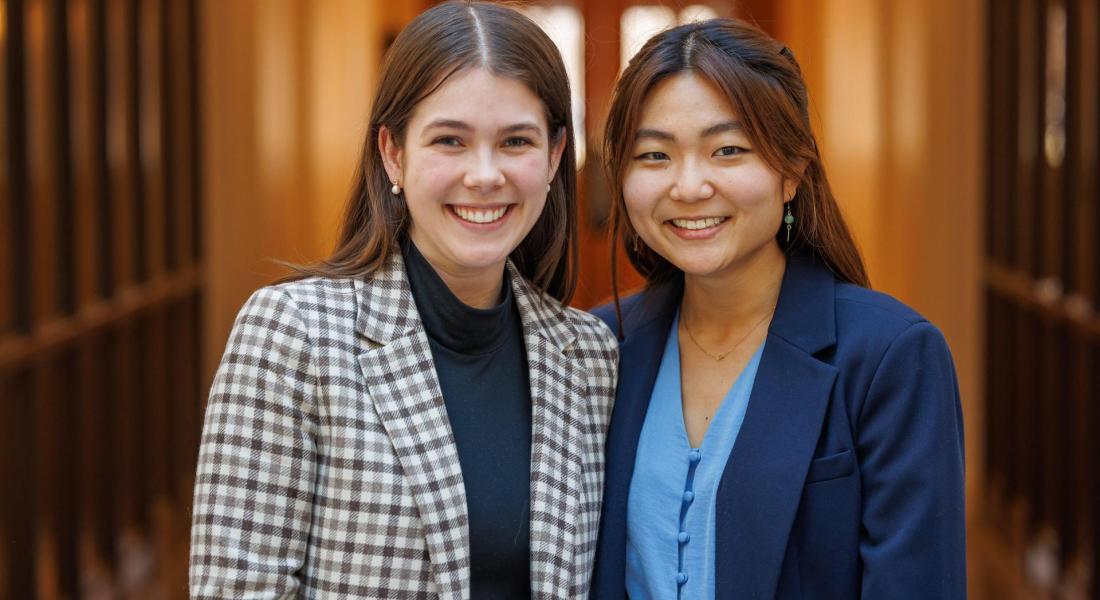
The Kellogg Institute for International Studies will host the 14th annual Human Development Conference Friday and Saturday, February 25 and 26. Conference events will take place in the Hesburgh Center for International Studies and Jenkins-Nanovic Halls, with hybrid and virtual options also available due to the COVID-19 pandemic.
This year’s conference chairs are seniors Maria Teel and Stella Cho (pictured above), who oversee a team of students managing logistics, marketing, research presentations and graphic design.
Within the topic of human development, the focus theme for 2022 is “Our Global Responsibility: Seeking Inclusive Growth Amidst Widening Inequality.”
During the pandemic, Cho and Teel recognized the potential for the conference to work on “how to seek growth out of adversity.”
As virus case rates fell during the summer, Cho said she felt hopeful about the future of inclusive growth, but the pandemic exacerbated some disparities and highlighted inequalities in areas such as education and healthcare. Cho added that inclusive growth is a broad term that encompasses more than just economic growth.
Conference recognizes student research, holds panels
The conference will consist of a keynote address by economist John Cavanagh, former director of the Institute for Policy Studies, as well as student panel discussions and a student mixed media display. Students participating in these events hail not just from Notre Dame but from universities around the world.
Cho and Teel were connected to Cavanagh through professor Ray Offenheiser, director of the Pulte Institute for Global Development and former president of Oxfam America.
“[Offenheiser] has so many connections in the world of international development, but also governmentally, internationally,” Cho said. Offenheiser knew Cavanagh through their work in Oxfam and on the water crises in Latin America.
After the keynote address this afternoon, the winners of the Bartell Prize for Undergraduate Research on Poverty and Development will be recognized. Additionally, there will be a reception and mixed media display event.
On Saturday, the conference will hold three sessions in which attendees can choose which panel to attend. Each panel has a topic and is moderated by a professor. The panelists are students from Notre Dame and other institutions presenting their research.
“I’m really looking forward to being on a panel with other students who are researching similar content and engaging with students from other colleges and around the world,” Teel, who will be presenting her own research at the conference, said.
The conference will end with concluding remarks and a reception. There will also be an opportunity for post-conference virtual networking for virtual attendees who cannot network in person.
Hybrid format allows conference to grow, presents challenges
After Cho and Teel were appointed conference co-chairs in July, their first step was to develop a theme. Early in the fall semester, they began spreading the word about the conference and assembling their team, as well as calling for papers and mixed media.
In terms of logistical planning, Cho and Teel had to consider how they would address the challenges presented by the pandemic. They decided the conference would take place using a hybrid format, with attendees, presenters and moderators having the option to attend every session virtually.
“Hybrid was our greatest challenge,” Teel said.
Teel said the great networking opportunities at the conference are an important aspect of the conference.
“All those little interactions have become slightly more complex,” Teel said.
To facilitate those connections, Cho and Teel established a Slack channel so that participants can directly message each other and “continue the conversation even after the conference is over.”
However, the hybrid model has also allowed the conference to grow.
“It’s amazing the scale we’re able to grow our conference in because of the virtual model,” Cho said.
Cho also praised the technology, especially in Jenkins-Nanovic Halls, that facilitates virtual attendance and presentations. “It’s amazing the capacity that we have at the University to host this conference,” Cho said.
Teel said that she hopes that the hybrid model will be able to “incorporate people internationally” in future years as well. Without the travel barrier, Teel said she hopes it will be easier for international researchers to submit their work.
Conference allows students to network, gain motivation
Cho and Teel encouraged younger students to get involved in the conference. There is no requirement for a particular major or level experience.
Teel has had a minor in International Development Studies since her first year at Notre Dame, so she said she has always had an interest in human development. She began her work with the conference her junior year as the co-chair for the abstracts committee, managing who would present their research.
“Starting out in committee work… was really enjoyable, so I would recommend that,” Teel said.
Cho, who is majoring in neuroscience and Spanish, was drawn to the conference by her interest in public health and global health, spurred by her Experiencing the World Fellowship in Guatemala. She was on a committee her sophomore year and was co-chair of the logistics committee last year.
“I want to stand for all the people who are interested in global health,” Cho said. “[The conference] has so much to offer from so many different backgrounds.”
The conference opens applications for committee members in the fall semester, but for now, Teel invites all students to attend the conference.
“It’s a real opportunity, an opportunity that I myself took as an underclassman, to come and see what other upperclassmen have done as their research, who are good faculty to contact,” Teel said.
She said the conference is especially valuable for students who will need to do research for a capstone or thesis.
Cho and Teel hope attendees leave the conference with a better understanding of their global responsibility and their ability to shape the future of the world. Their goal is for attendees to “feel motivated in their own area of expertise to do some good in the world” at the end of the conference, Cho said.
“Hopefully it’s a meaningful experience for all of us,” Cho said.





